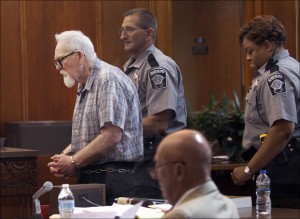Insanity defenses face long odds
By: Eric Heisig//August 13, 2013//
Olajuawon Bell’s doctors reported he probably was experiencing “command auditory hallucinations and persecutory delusions” when he beat and stabbed his mother’s boyfriend to death.
The 25-year-old Bell, who is diagnosed with schizoaffective disorder, was arrested in November and later pleaded not guilty by reason of insanity. In June, Milwaukee County Circuit Judge Jeffrey Wagner agreed Bell was unable to control his actions when he committed the killing and sentenced him to life in a state mental hospital.

It was a rarity in Milwaukee County, a district in which judges and juries set high standards for mental illness defenses in homicide cases.
Despite a few recent cases in which the defense was raised — most recently for 76-year-old John Spooner, who was caught on camera shooting a teenager — local judges, attorneys and court observers say there has been a decline in the frequency of mental-illness defenses.
Since 1991, Milwaukee Deputy District Attorney Kent Lovern said, there have been 10 homicide cases in Milwaukee County in which judges ruled a defendant was not guilty by reason of insanity. That is out of more than 2,300 homicide cases that made it to judgment.
And there are no instances of a jury making that finding, Lovern said, even though some have tried.
Walter Dickey, a professor at the University of Wisconsin Law School, said there may be an increase in public skepticism about the defense and whether defendants use it to avoid responsibility for their actions.
The defense often is used out of desperation, Dickey said, when there is little doubt a defendant committed the act.
“In the legitimate cases, you often see the prosecutor agreeing,” he said. “They’re so compelling that the prosecutor allows the plea.”
And if a claim is legitimate, there still is a high standard to prove through compelling evidence that insanity was at the root of the crime, said Donna Kuchler, a Waukesha criminal defense attorney at Kuchler & Cotton SC.
Wagner, who has been a Milwaukee County circuit judge since 1988, said he agreed.
“If you don’t have an expert that’s going to be supporting that position,” he said, “you’re not going to be going that far with that defense.”
And the defense often fails even when there is an expert supporting the claim. Jeffrey Dahmer’s defense, for instance, relied on an insanity plea, but it was not strong enough to convince a Milwaukee County jury despite the gruesome facts in the case. Those jurors convicted him in 1992 of killing 15 people, and he was sentenced to life in prison.
“If a jury didn’t find him insane, you can see what a tough row to hoe it is,” said Milwaukee County Circuit Judge John DiMotto, who was not involved in the Dahmer case.
In Spooner’s case, his shooting and killing teenager Darius Simmons was caught on Spooner’s surveillance cameras, and it didn’t take long for a jury to convict him in July.

In the next phase, the jury considered Spooner’s mental state at the time of the shooting. But unlike the Bell case, in which experts agreed on the defendant’s mental state, there was disparity in the diagnoses of Spooner.
Basil Jackson, a psychiatrist who was hired by Spooner’s attorney, diagnosed the defendant with a hypomanic personality that caused him to lose control and gun down Simmons.
Doctors for the prosecution, however, reported something very different. According to an April 22 report by forensic psychologist Deborah Collins, “I recognize that Mr. Spooner did not resist an urge to engage in aggressive and lethal conduct toward the victim. The fact that he did not resist the urge, however, does not mean he lacked the capacity to do so.”
The defense was unsuccessful. Wagner sentenced Spooner to life in prison.
The difference between success and failure in an insanity plea, Kuchler said, often boils down to how well the defense characterizes a person’s state of mind in a moment in time.
“Being mentally ill isn’t sufficient basis,” she said. “I wouldn’t be surprised … if more than 50 percent [of defendants] may have some mental illness.”
Legal News
- Some State Bar diversity participants walk away from program
- Wisconsin court issues arrest warrant ‘in error’ for Minocqua Brewing owner
- Iranian nationals charged cyber campaign targeting U.S. Companies
- Facing mostly white juries, are Milwaukee County defendants of color truly judged by their peers?
- Milwaukee Mayor speaks in D.C. Tuesday at White House water summit
- Chicago man sentenced to prison after being caught with ‘Trump Gun’
- FTC bans non-competes
- Gov. Evers seeks applicants for Dane County Circuit Court
- Milwaukee man charged in dismemberment death pleads not guilty
- Democratic-led states lead ban on the book ban
- UW Madison Professor: America’s child care crisis is holding back moms without college degrees
- History made in Trump New York trial opening statements
WLJ People
- Power 30 Personal Injury Attorneys – Russell Nicolet
- Power 30 Personal Injury Attorneys – Benjamin Nicolet
- Power 30 Personal Injury Attorneys – Dustin T. Woehl
- Power 30 Personal Injury Attorneys – Katherine Metzger
- Power 30 Personal Injury Attorneys – Joseph Ryan
- Power 30 Personal Injury Attorneys – James M. Ryan
- Power 30 Personal Injury Attorneys – Dana Wachs
- Power 30 Personal Injury Attorneys – Mark L. Thomsen
- Power 30 Personal Injury Attorneys – Matthew Lein
- Power 30 Personal Injury Attorneys – Jeffrey A. Pitman
- Power 30 Personal Injury Attorneys – William Pemberton
- Power 30 Personal Injury Attorneys – Howard S. Sicula











